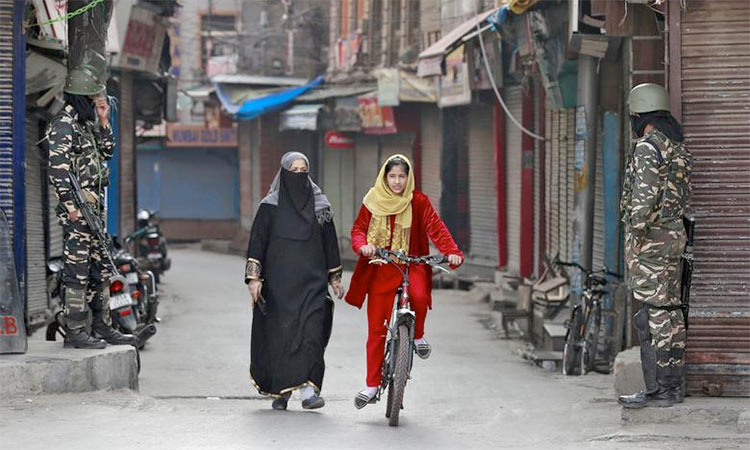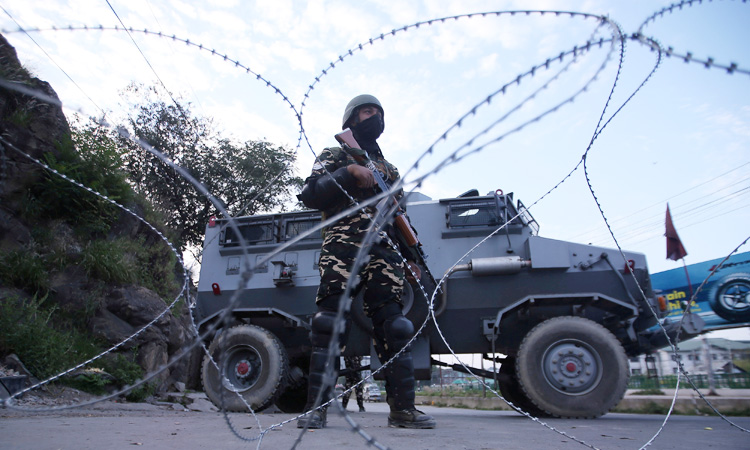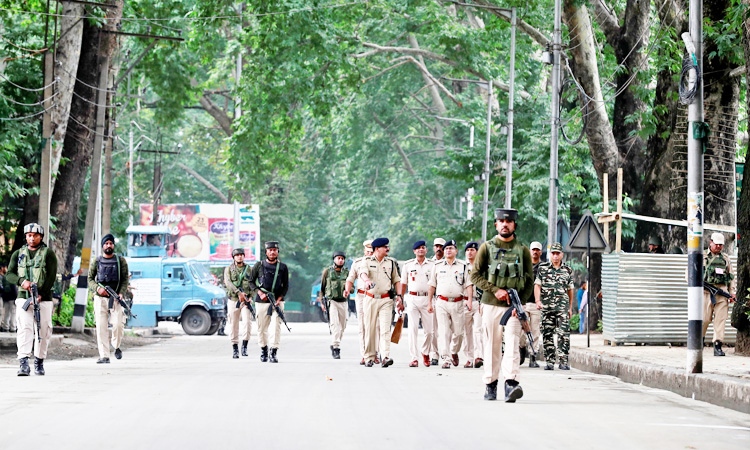SC directs Centre to restore normalcy in Kashmir

Kashmiris take cover behind tin sheets during clashes in Srinagar. Reuters
Farooq Abdullah, 81, who also was the former chief minister of Jammu and Kashmir, was arrested at his residence in Srinagar.
“We have arrested him, and a committee will decide how long the arrest will be,” said Muneer Khan, a top police official.
Abdullah is the first pro-India politician who has been arrested under the Public Safety Act, under which rights activists say more than 20,000 Kashmiris have been detained in the last two decades.
Amnesty International has called the PSA a “lawless law,” and rights groups say India has used the law to stifle dissent and circumvent the criminal justice system, undermining accountability, transparency, and respect for human rights.
The PSA came into effect in 1978, under the government of Abdullah’s father, who himself was a highly popular Kashmir leader.
The law, in its early days, was supposedly meant to target timber smugglers in Kashmir. After an armed rebellion started in the region in 1989, the law was used against rebels and anti-India protesters.
Abdullah’s residence was declared a subsidiary jail and he was put under house arrest on Aug. 5 when Indian Prime Minister Narendra Modi’s government in New Delhi stripped Jammu and Kashmir of semi-autonomy and statehood, creating two federal territories.
Thousands of additional Indian troops were sent to the Kashmir Valley, already one of the world’s most militarised regions. Telephone communications, cellphone coverage, broadband internet and cable TV services were cut for the valley’s 7 million people, although some communications have been gradually restored.
Home Minister Amit Shah denied to the lower house of Parliament that Abdullah had been detained or arrested.
“If he (Abdullah) does not want to come out of his house, he cannot be brought out at gunpoint,” Shah said, when other parliamentarians expressed concern over Abdullah’s absence during the debate on Kashmir’s status.
Meanwhile, the Supreme Court sought a response from the central government and the Jammu and Kashmir administration on a plea seeking to produce Abdullah before the court.
Many anti-India protesters as well as pro-India Kashmiri leaders have been held in jails and other makeshift facilities to contain protests against India’s decisions, according to police officials.
The Centre on Monday told the Supreme Court that restrictions have been eased in most parts of Jammu and Kashmir and health services were functioning normally for those people who came from far-flung areas in the valley.
The government informed the apex court that it has opened Internet kiosks at the National Informatics Centre (NIC) in the Kashmir Valley to facilitate people with web facilities.
Attorney General KK Venugopal said that in 2016 when a terrorist was killed, the whole state went into a turmoil. There was a similar shutdown for three weeks back then by the state government, Venugopal said, adding the Centre was easing movements in the valley.
Solicitor General Tushar Mehta told the Supreme Court that neither a single bullet was fired nor a single life lost after the abrogation of Article 370.
He also told the Court that prohibitory orders under Section 144 of Jammu and Kashmir Code of Criminal Procedure have been relaxed in 88.57 police stations of the Kashmir Division and 100 per cent in the Jammu and Ladakh divisions.
Health services were functioning normally in the valley as 10.52 lakh patients visited hospitals in Kashmir for check-ups till September 15.
He also told the court that doctors have successfully performed 10,699 major surgeries including caesarean deliveries.
Mehta added there is no dearth of essential drugs and other medical requirements in the hospitals and 90 per cent of medical shops were open in the valley.
The Centre is taking care of drinking water, electricity, three months’ stock of essential commodities like food grains, LPG cylinders and petrol.
Similarly, several steps have been taken for ensuring the smooth flow of information including various newspapers that are regularly being published from Srinagar.
Agencies







